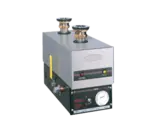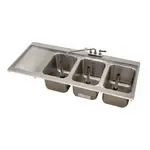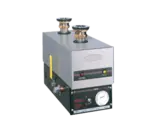.webp)
Chemical vs. Hot Water Sanitizing
Warewashing is an essential part of any restaurant, keeping glassware clean and sanitized for everyday use. Thus, a restaurant’s glass washer is a pivotal accessory in the kitchen setup. When it comes to investing in the right glass washer for your restaurant, there are two main options to consider: chemical versus hot water sanitizing. While both achieve the requirement for sanitizing your dishes, there are pros and cons to consider for each option. Choosing between chemical and hot water sanitizing glass washers is based on your individual restaurant’s needs, so let’s have a look at some of the main differences.
After your dishes are cleaned, they are sent through a process to sanitize the surfaces. The sanitizing process is aimed at reducing the amount of bacteria and microorganisms on your glassware. Your glass washer should be free of debris and buildup, as sanitizers - both chemical and thermal - cannot effectively do their job on grimy surfaces. Onces your dishes are cleaned, the sanitizing process can step and and do the work!
Chemical Sanitizing
In chemical washers, sanitizing glassware involves the use of - you got it - chemicals! The benefit of chemical sanitizing machines is that the temperature is able to be set at a lower setting (120 degrees), and your energy bills will reflect those savings. A chemical product usually containing Chlorine is injected into the machine following the cleaning cycle and during the final rinsing cycle.
The costs the chemicals you choose to use is typically where the largest investment lies with chemical sanitizing machines. The FDA also requires that you keep test strips on site to constantly monitor and verify that your machine is using the proper amount of chemicals for safe sanitizing. Both too weak and too strong of chemical sanitizer in your machine can result in unsatisfactory results such as unsafe glassware or strong chemical flavorings. The Association of Nutrition and Foodservice Professionals describes the approved chemicals that are typically used for these machines:
Three basic sanitizers are allowed in food service: Quaternary ammonium (“Quat”), chlorine-based, and iodine. Sanitizer effectiveness is based on several factors: concentration of the solution, water temperature, water hardness, and contact time with the dishes. Any sanitizer being used for food contact surfaces must be ePA approved for that use. Of course, as previously mentioned, test strips are a must.
Hot Water Sanitizing
Contrary to chemical sanitizing, hot water sanitizing only requires the use of heat to disinfect dishware. Sanitizing water must be maintained at 171 degrees to achieve acceptable levels of sanitizing, and your energy bill will reflect this in the cost. Your machine must also be capable of heating rinse water to 180 degrees, and your dishes will be aided in this sanitizing process through the use of dipping racks. Conversely, your machine cannot heat water past 194 degrees or you’ll run the risk of cooking the food onto your dishes.
Checking the efficiency of your machine to ensure that it complies with sanitizing standards, inspectors will usually check the plate temperature rather than water temperature directly (as this can be difficult to do when the machine is running). After a properly-heated rinse cycle, plate temperature should be at 160 degrees or higher. A warewashing thermometer or heat tape can be placed on the plate during the cycle to verify the correct temperature.
The Takeaway
Both types of sanitizing machines cannot effectively sanitize dishes if they are operated and maintained incorrectly. Don’t overload your washing machine, and scrape off excess food before loading it. If you have a chemical washer, ensure all lines are open and properly connected. Allow dishes to completely dry after the last cycle to prevent ‘wet nesting’ wherein dishes stacked with moisture will retain wetness and promote bacterial growth. Clean your machine at least once a day by freeing it of any trapped debris to keep it functioning properly!
JENIFER AQUINO
Sales Consultant
CKitchen.com
E Friedman Associates Inc
T: 800-555-0666 x 1975
D: 516-882-1975



